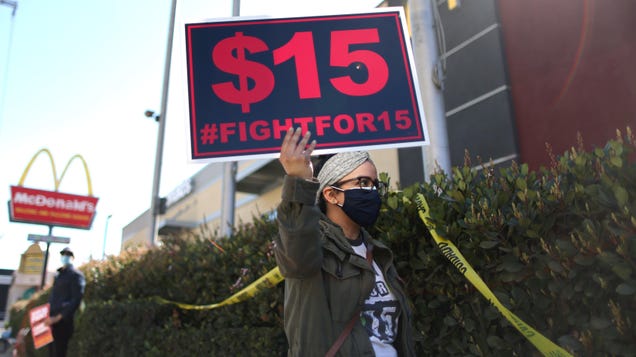Earlier this week, the California Senate passed a bill, which would create a fast-food council, comprised of employers, employees, and government officials, that establishes industry-wide minimum standards on wages, working hours, and other working conditions like health and safety. California governor Gavin Newsom has until Sept. 30 to sign it.
If the bill becomes law, the 10-person council could decide to raise the minimum wage to as high as $22 an hour in 2023. (Currently, the minimum wage in California starts at $14 an hour, depending on the number of employees at the organization.) The bill would affect more than 550,000 workers across the state. The proposal points to how quickly conversations around service-industry wages have changed since the movement to raise minimum wages for fast-food workers to $15 an hour started a decade ago.
$15 an hour is become outdated amid labor shortages and inflation
In 2012, fast-food workers in New York City walked off the job to demand $15 an hour and the right to unionize. Since then, the movement to raise the minimum wage to $15 an hour has found success in states and cities across the US.
At least eight states have adopted a gradual $15-an-hour pay floor, according to the National Conference of State Legislatures. At least 21 cities, largely concentrated in California, have raised their hourly wage floors to $15 or more. Over 40% of the US workforce is in states with minimum wages climbing to $15 or more. In addition, workers’ expectations for job earnings have risen—on the jobs site Indeed, searches for work that pays $20 an hour have surpassed searches for $15-an-hour jobs. Still, five states, Alabama, Louisiana, Mississippi, South Carolina, and Tennessee, have not adopted a state minimum wage, tying pay to the federal wage floor of $7.25 an hour. That could have changed if a mandate for a $15 federal minimum wage had not been taken out of president Joe Biden’s 2021 covid-19 stimulus plan.
At the same time, the average wages of restaurant workers have also surpassed $15 an hour, according to US Bureau of Labor Statistics (BLS) data. Inflation and a labor shortage throughout the pandemic have triggered the wage gains. Though, pay raises are barely rising faster than inflation: In July, the average hourly wages for restaurant employees rose 8.7% from the year before, while inflation increased 8.4% in that same period, according to the BLS.
In California, the industry is pushing back on the fast-food bill. The International Franchise Association argued that the bill would hurt smaller franchise operators and could raise prices for them. Meanwhile, McDonald’s US president Joe Erlinger claims that he welcomes the wage gains but that the approach targets some some types of restaurants, specifically, national fast-food chains, but not others.


